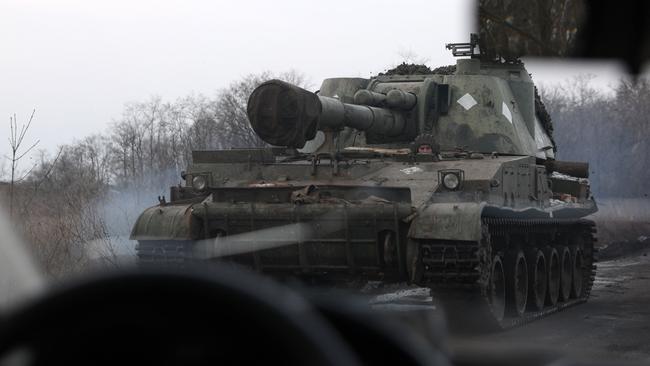
Senior defence and military officials from dozens of countries, including NATO members, will meet on Friday at Ramstein Air Base in Germany. The decisions they make there will shape — and may determine — the course of Russia’s war of aggression against Ukraine in 2023 and beyond.
It’s clear that to achieve victory in Ukraine, Russia is willing to commit war crimes from the air and free criminals from prison to fight the hard battles on the ground. The West must not let this strategy succeed.
The Ukrainians have shown that they have the will to fight and endure privation to achieve victory. The task of the West — and in particular of the US, as leader of the West — is to ensure that they have the means to do so.
For months, Western countries have rebuffed urgent Ukrainian requests to send heavy tanks, such as the American M1 Abrams, the German Leopard and the British Challenger 2.
Now the wall of resistance is crumbling. The British government has said that it will send 14 Challenger 2s to Ukraine, and the Poles have announced that they intend to send 14 Leopards — if Germany, which must authorise these transfers, consents.
But the real action is in Washington and Berlin. Last week Laura Cooper, a US Deputy Assistant Defence secretary, said that “we absolutely agree that Ukraine does need tanks”. Still, the US has declined to provide the Abrams, citing fuel and maintenance issues. Published reports suggest that the US has about 4800 of these weapons, including more than 400 freed up by the Marine Corps’ decision to transform its war-fighting strategy. Surely we can spare some to help Ukraine break through Russian lines. It is hard to see a more important and urgent use for them.
A US announcement that it will do so before the Ramstein meeting would remove Germany’s last excuse for not providing Leopard 2s to Ukraine, and the resignation on Monday of Germany’s hapless defence minister provides the perfect opportunity for a policy pivot.
Last week Vice Chancellor Robert Habeck said that “Germany should not stand in the way when other countries make decisions to support Ukraine, regardless of what decision Germany makes,” flashing a green light to the Poles and the Finns. Now Chancellor Olaf Scholz must take the final step and send Ukraine some of Germany’s estimated 350 Leopard 2s. Even a handful would send Russian President Vladimir Putin a powerful message.
Along with tanks, Ukraine needs weapons that can counter Russia’s bombardment from the air. The deadly attack on Dnipro last week showed that Russia is prepared to use heavy, inaccurate ballistic missiles armed with 2000-pound warheads against Ukrainian civilians in large cities. Only the most advanced anti-missile systems can protect against these weapons.
Last month the Biden administration agreed to include one battery of the Patriot missile system as part of the latest package of aid to Ukraine. This is a good start, but it isn’t enough. According to a report from the International Institute for Strategic Studies, the US military has 16 Patriot battalions with a total of 50 batteries. No doubt some batteries are out of service for repairs or other reasons. Still, the US can send Ukraine more than one battery, and it should do so as fast as possible. It will take time to train Ukrainians on this system, though they have proved to be quick studies. At the same time, NATO should endorse Warsaw’s request that two German Patriot batteries designated for Poland be sent to Ukraine instead.
Everything depends on American leadership of the pro-Ukraine coalition. President Joe Biden remains determined to provide it, but continuing it beyond the fall will require congressional support. Led by minority leader Mitch McConnell, many Republican senators will stand with Democrats to ensure continued aid to Ukraine. The question is whether House of Representatives Speaker Kevin McCarthy is willing to face down the isolationists in his caucus.
This will take work — and backbone. Research conducted by the Chicago Council on Global Affairs found Republican support for military aid to Ukraine declining from 80 per cent at the start of the war to 68 per cent in July and 55 per cent in early December. A CBS News poll conducted in early January found that Republican support for continued aid had slipped to 48 per cent, compared with 65 per cent for independents and 81 per cent for Democrats.
Sixty-five years ago, farsighted Republicans led by senator Arthur Vandenberg overcame the isolationists in their ranks and, together with president Harry S. Truman, forged a bipartisan front against Soviet expansionism that endured until the fall of the Berlin Wall and the collapse of communism. It wasn’t cheap, but it was one of the best investments US taxpayers ever made.
Today, faced with resurgent Russian aggression, McCarthy faces a similar choice. If he yields to the shortsighted forces in his own ranks, he will damage America’s national security, and history will not judge him kindly.
The Wall Street Journal
Read related topics:Russia And Ukraine Conflict



